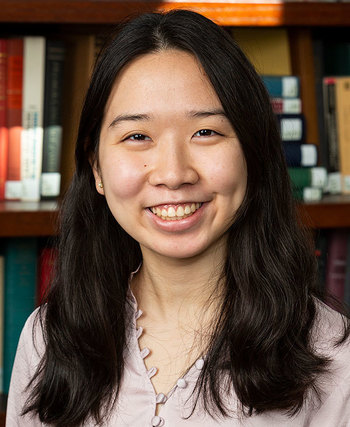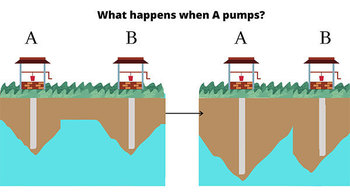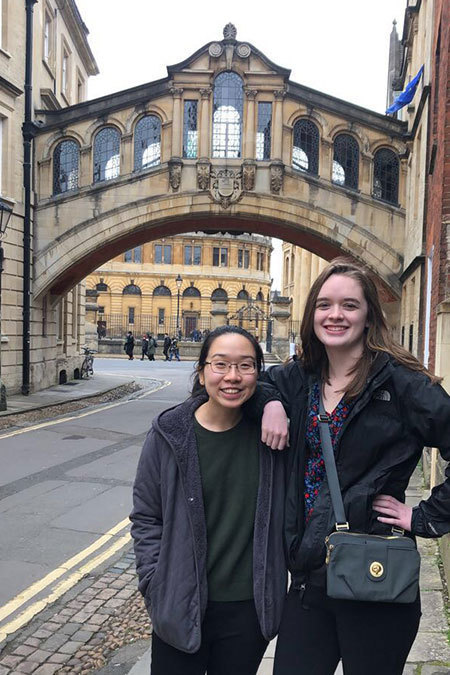
In California, the land is sinking because the groundwater reservoirs have become so depleted; in Florida, groundwater overuse has led to the development of sinkholes, and in Louisiana, groundwater declined 200 feet between the 1930s and the 1970s.
Groundwater overuse is nothing new. But in her senior thesis, Notre Dame senior Mika Inoue is taking a new approach. Drawn to major in economics and applied and computational mathematics and statistics based on her interest in the intersection of qualitative and quantitative analysis, Inoue is working with a committee of interdisciplinary professors and researchers to develop a model for integrating real-life scenarios into groundwater pumping models.
Her thesis analyzing groundwater markets and the overpumping of groundwater synthesizes many commonly overlooked factors into a model that she hopes can be applied to the development of future markets.
“I'm trying to ease the tension between the math and the real world,” she said. “It doesn't really just become this quantitative thing where you just spit out numbers and spit out conclusions and you say, that's it. I think it's also about trying to figure out ways to apply what you're finding.”
While her thesis includes quantitative aspects through the theoretical model she has developed, it also remains qualitative in that it focuses on policies and laws and tries to examine the impact that these groundwater markets have on real people. Because prior research on the topic didn’t integrate these perspectives, it underestimated the impact of excessive groundwater pumping.

“What happens when you pump groundwater is that you impose a cost both on yourself and also on the other people who are pumping where you are, because you keep lowering the water table as you pump,” she said. “But it doesn't just lower the water table for you, it lowers the water table for everyone. And so what happens when you have a situation like that is that you create kind of an externality — you're imposing a cost on the other player that you never factor in when making your own pumping decisions.”
Her model provides context for how the groundwater market may behave in more complex scenarios and may be impacted by real-life circumstances. She hopes that market designers and governments can use this model to consider the issues in a more nuanced way.
“Given how dire the situation of unsustainable groundwater abstractions is becoming, it's a really pressing issue that more areas develop a market that's adaptable to both the hydrological parameters, as well as the unique legislative conditions of the area,” she said.
Inoue’s research focuses predominantly on the U.S. but also internationally on places such as Australia. To examine this interaction, she used Mathematica — a computer program she was unfamiliar with and had to teach herself.
Although she has had a consistent interest in developmental and environmental economics, her initial thesis proposal had nothing to do with groundwater — she planned to explore behavioral economics. But because of a pandemic-induced funding freeze, she was unable to obtain the resources necessary to run her experiments for this initial proposal, so she chose instead to focus on groundwater with support from a pre-established team of researchers at Notre Dame— engineers, lawyers, and economists — to ensure her research was thorough and comprehensive.
“I was really, really lost in the beginning,” she said, since she had never worked with a theoretical model before.

She did, however, have extensive experience with research on pre-existing data sets. For the past three years, Inoue has been involved in research with A. Nilesh Fernando, an assistant professor of economics, investigating labor economics and outcomes for migrants from places including Sri Lanka and India through writing, coding and data analysis.
Working with her advisor, Michèle Müller-Itten, and the team of Notre Dame faculty, Inoue went from a model whose output was incorrect and returning impossible negative prices to a thesis that was 38 pages long. She had weekly meetings with Müller-Itten — which continued without pause through winter break — and attended meetings hosted by the Notre Dame groundwater research group.
One particular area that these researchers encouraged her to explore further was the impact of restrictions on pumping. Prior to meeting with the group, Inoue assumed that once a pumper had rights to an area, they could pump anywhere in it.
“I found out that actually a lot of areas had some kind of restrictions to it,” she said. “There were certain areas where you could buy the right, but you couldn't actually pump in that area, or things like that. And so it kind of added another kind of layer to my model, which was helpful.”
Her interest in environmental economics came, in part, from having grown up in the Philippines and seeing firsthand the impact groundwater supply can have on a developing country. After graduation, she will be working full time as a research analyst at Northwestern’s Global Poverty Research Lab.
Her thesis serves as the culmination of her academic interests and has prepared her for her post-graduation career.
“It's just been a great opportunity,” she said. “I've come out of it learning so much more about this field, and it's been really interesting to see that I can explore beyond things that I was used to.”
Originally published by at al.nd.edu on May 18, 2021.
